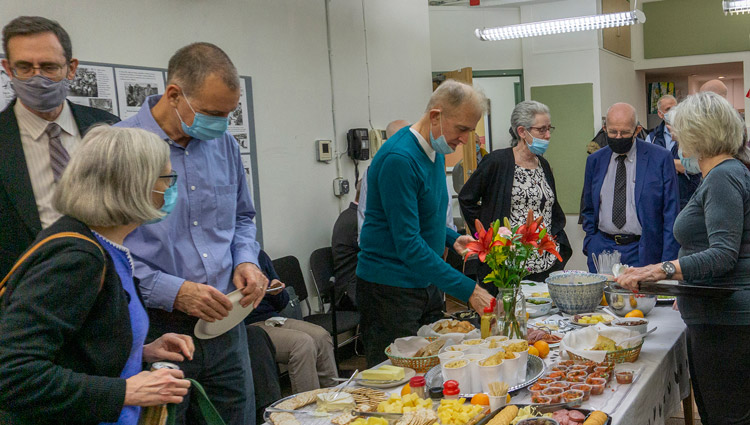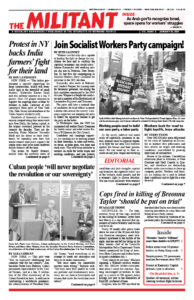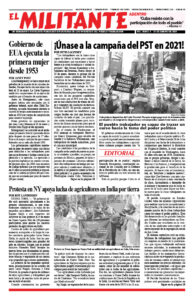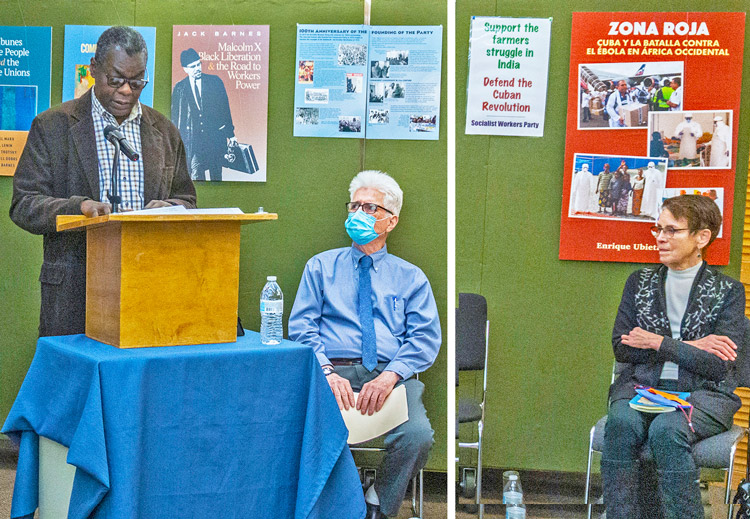NEW YORK — This past year “was an especially challenging and complex year for our country,” Ambassador Pedro Luis Pedroso, Cuba’s permanent representative to the United Nations, said at a Jan. 9 celebration of the 62nd anniversary of the Cuban Revolution here. In addition to confronting a worldwide pandemic, the administration of President Donald Trump “tried everything in its attempt to break our resistance and force us to make concessions.”
“But once again the imperialist masters were wrong,” Pedroso said. “Not only were they unable to crush our patriotic and revolutionary resistance, we can show achievements and lessons that make the revolution more robust.”
Quoting Cuban President Miguel Diaz-Canel, he added, “They insisted on killing us, but we insisted on living and winning. The Cuban people exceeded their own expectations.”
More than three dozen people joined together at the meeting, which was organized by the New York and New Jersey branches of the Socialist Workers Party. Members of the local Cuba Sí coalition also participated.
Surrounded by displays of enlarged photos taken from Pathfinder Press’ Red Zone: Cuba and the Battle Against Ebola in West Africa by Enrique Ubieta — which describes how Cuba’s internationalist medical workers were decisive in pushing back the deadly disease — participants enjoyed a large spread of good food. Ubieta is the editor of Cuba Socialista, the theoretical magazine of the Central Committee of the Cuban Communist Party.
Stands full of books on working-class history and writings by SWP leaders, Cuban revolutionaries and other revolutionary fighters lined one wall at the meeting.
“I really appreciate that people in America are celebrating the Cuban Revolution,” Tarik Haskins, a member of the New York-New Jersey Cuba Sí coalition and Black Panther who spent years behind bars as a political prisoner, told the Militant. “It’s important to me that the Cubans contributed to the liberation of the whole southern African region, with a decisive role in the battle of Cuito Cuanavale that was key to the freedom of Angola.”
Support for Cuba in the U.S.
Pedroso noted the SWP’s long, unbroken history of support in the U.S. for the struggle to build an “independent, sovereign and socialist Cuba.”
“Even under the most difficult conditions,” he said, “you have been resolutely and decisively supporting our demands for the end of the unjust and criminal economic, commercial and financial blockade that 12 U.S. administrations have maintained against our country, seeking to bring the revolution and our people to their knees.”
“Not even the COVID-19 pandemic could hamper your extraordinary solidarity with Cuba,” Pedroso said.

The ambassador singled out three of the public activities organized in New York since the pandemic began — the launch of the Pathfinder edition of Red Zone at a well-attended event at The People’s Forum in early March; a July 26 picket line at Union Square on the anniversary of the attacks by Cuban revolutionaries on the Moncada Barracks in Santiago de Cuba and the Carlos Manuel de Céspedes Barracks in the city of Bayamo in 1953, considered the opening of the Cuban Revolution; and a car caravan Dec. 17 demanding an end to the U.S. economic war against Cuba.
He also thanked the Militant newspaper for its “tremendous contribution” in telling the truth about the Cuban Revolution over the past six decades.
Pedroso noted that the Cuban people will continue to face challenges in the coming year. “We learned long ago that for those who do not make concessions, there are no easy circumstances.
“While continuing to face the impact of a criminal blockade, Cuba must strengthen its economy, resume economic growth and development, and permanently control the incidence of COVID-19 in our country,” he said. “With the permanent faith in victory that Fidel left us, we are convinced that our people will sail safely through the new challenges.”
The ambassador reiterated his country’s willingness to build a “respectful and lasting relationship” with the United States, but “we will never accept concessions in our principles or conditions of any kind,” he said. “We will never negotiate the revolution, socialism, or our sovereignty.”
A socialist revolution
Pedroso was introduced by Mary-Alice Waters, a longtime member of the SWP National Committee, and editor of Pathfinder Press’ series of more than 30 books on the Cuban Revolution.
“It was 62 years ago yesterday that the Liberty Caravan led by Fidel Castro entered Havana after a weeklong journey across Cuba,” Waters said. In every city and town, the population poured into the streets to welcome Fidel and the “Men of Moncada.”
“The popular revolutionary insurrection had triumphed, opening the door to the first free territory, the first socialist revolution in the Americas.”
“The greatest tribute to Fidel’s leadership and to the capacities of Cuba’s toilers” is that fact: 62 years and counting, she said, “and the Cuban Revolution still stands.”
Waters pointed to the internationalism of the revolution, especially the hundreds of thousands of Cubans — including Ambassador Pedroso — who between 1975 and 1991 had helped defeat the U.S.-backed South African army invasion of Angola, leading to the independence of Namibia, the release of Nelson Mandela and the end of the apartheid regime.
The bourgeois media — both mass and social — refer to the Jan. 6 events at the U.S. Capitol as an “insurrection,” Waters said. “They howl in fear, not of Trump or a handful of out-of-shape paramilitary conspiracy theorists, but of the tens of millions of ‘deplorables’ — working people — who refused to vote for Joseph Biden and Kamala Harris.
“They refused because they know them and what a Biden-Harris administration will mean for the working class. That lesson was learned from the bitter experience of life under the Clintons, Bush and Obama.”
The Cuban Revolution was the real thing, Waters said, “a genuinely popular revolutionary insurrection.” When the Batista regime crumbled in face of the revolutionary uprising of millions led by the Rebel Army and July 26 Movement in 1959, “workers and farmers of Cuba began to remake their society. For the first time since the early years of the 1917 October Revolution in Russia they began to show the world what socialism and communism really mean.”
“The Cuban Revolution is our revolution as well,” Waters said. “Together with the revolutionary struggle of the Black proletarian masses that brought down Jim Crow segregation and changed social relations in the U.S. forever, it showed new generations of workers and youth the class forces capable of making a socialist revolution right here in the U.S.”
‘A good year’
Dave Prince, the Socialist Workers campaign chair in New Jersey and a longtime member of the SWP National Committee, also spoke.
“In 2020, as the brutal realities of the capitalist crisis unfolded, the SWP and its national ticket of candidates for president, Congress and other offices responded boldly to explain that the working class is the only class that can end the crises of the imperialist epoch, including its wars, racism, and exploitation,” Prince said. “The working class has to take power in struggles that transform us and use the power of a workers and farmers government to rebuild society on the foundation of solidarity in cooperation with the toilers of the world.” This is what the example of Cuba’s toilers has shown us.
“2020 was not a bad year for the Socialist Workers Party, it was a good year,” Prince said. “We stood with our class, going to work every day alongside millions of our co-workers, suddenly deemed ‘essential’ by the propertied rulers.”
Prince explained how members of the SWP spoke to thousands of workers and farmers on their doorsteps in cities, towns and rural areas across the country, how they joined strike picket lines and social protests. Prince said the party looks forward to an even better 2021, and introduced Joanne Kuniansky, the Socialist Workers candidate for New Jersey governor in 2021, and Candace Wagner, a rail worker (who couldn’t be there because she was working), as the party’s candidate for lieutenant governor.
He invited all interested to join in helping to put the SWP on the ballot in at least nine states.
Róger Calero, who chaired the program, announced the next activities planned by the Cuba Sí coalition in defense of the Cuban Revolution, beginning with a Jan. 31 car caravan.
Over $1,700 was raised for the work of the New York and New Jersey branches of the Socialist Workers Party. Participants ended the program with an apple cider toast to the Cuban Revolution.


